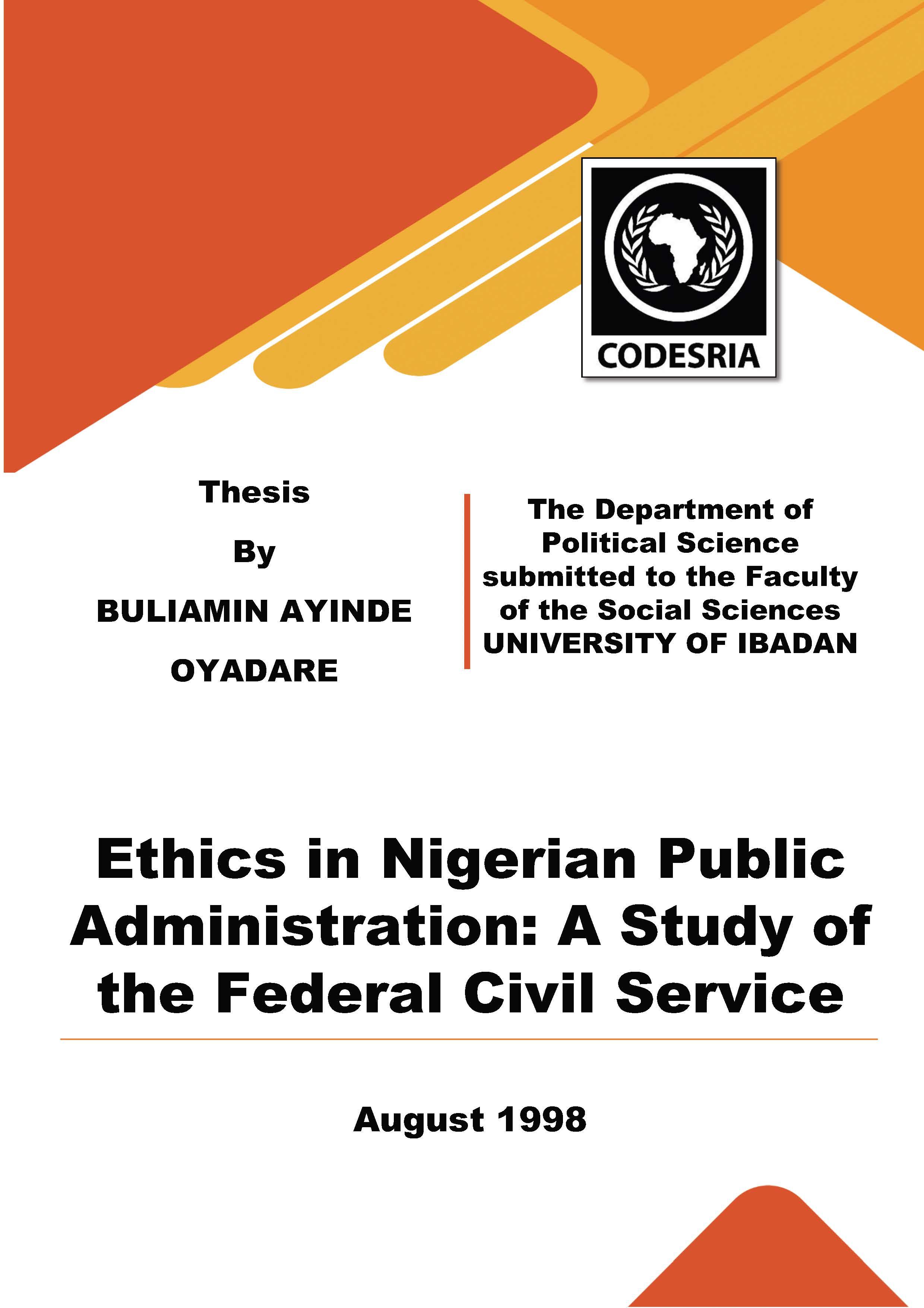Ethics in Nigerian Public Administration: A Study of the Federal Civil Service
Keywords:
Ethics, Public Administration, Federal Civil Service, NigeriaSynopsis
The Nigerian civil service tends to be poorly rated. Popular perceptions, pronouncements of high ranking public officials, reports of government-appointed commissions, observations by former top civil servants as well as academic assessments are all unanimous in scoring civil servants very low in their professional conduct. Above all, government's dissatisfaction with the operations of the civil service is demonstrated by its penchant for setting up extra-ministerial bodies to implement some crucial or pet projects.
Reference to professional standards has been identified as the key to the resolution of the problems facing the civil service. Curiously enough, administrative ethics is an issue that has rarely engaged the attention of both academics and practitioners in Nigeria despite the perennial search for a more responsive and effective civil service. At the policy level, there has been an over-reliance on the existing plethora of rules and regulations in place to guide the conduct of civil servants. In addition, many other ad hoe. measures have been taken to sensitize civil servants to ethical considerations. Sadly enough, all these protean measures have achieved very little practical results in awakening ethical consciousness and conduct among the Nigerian civil servants. In view of the foregoing, the study examines, among others, the following questions: What institutional arrangements and env.i ronmental factors (if any) impact upon the ethical behaviour of Nigerian civil servants? How effective is enforcement? What policy suggestions can be made to provide a conducive climate for ethical behaviour among Nigerian civil servants?
In effect, the prevailing state of professional conduct of Nigerian civil servants is deplorable and the need for action to remedy it has a particular urg~ncy. The study therefore set out to highlight both the institutional and ecological factors that shape the
ethical inclination of Nigerian civil servants with a view to proffering policy suggestions on how to raise ethical standards.
The significance of the study lies in its social relevance. Understanding the ethical disposition of Nigerian civil servants provides a window into the more abiding problem of efficiency in the civil service. In essence, the study is an attempt to focus on the
human factor in Nigeria's civil service which existing policies and studies have tended to ignore. Yet this human dimension is crucial as structures are given life by human beings.
In conducting the study, a field investigation of views of senior bureaucrats in the Federal civil service is undertaken. Responses from the field are processed and supplemented with documentary and archival search.
The findings of the study reveal a profound institutional gap which seriously circumscribes the efficacy of institutional contrivances. This problem of institutional gap is further compounded by ecological factors that bear on the performance of civil servants. In view of the foregoing, the study recommends what it describes as 'synergistic therapy' in curing the ills of the Nigerian civil service.
Downloads
References
Nigerian Opinion Vol. 1 No. 8 1965.
Peter P. 'Inside Shagari's Presidency'. Africa Now (London). July 1983
Obasi N. and Akabogu, C. 'The Civil Service, bureaucracy and National Development'. National Concord (Lagos) Oct. 27 1987 p. 3.
Akabogu, C. 'Civil Service: Reform or Regression?'. National Concord (Lagos) Jan. 22 1988 P. 3
Akinniyi, N. 'Towards a Virile Civil Service'. Punch Lagos) Aug. 23 1991 P: 14.
Dutse, O.A.G. 'The Attitude of our civil servants'./ New Nigerian (Kaduna) Feb. 4 1992 p. 7.
Akinnaso, N. 'The Culture of Civil Service'. The Guardian (Lagos Jun 2, 992 P. 25. The Guardian (Lagos) Dec. 25, 1993 p. 2






